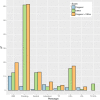Epigenetic prediction of complex traits and death
- PMID: 30257690
- PMCID: PMC6158884
- DOI: 10.1186/s13059-018-1514-1
Epigenetic prediction of complex traits and death
Abstract
Background: Genome-wide DNA methylation (DNAm) profiling has allowed for the development of molecular predictors for a multitude of traits and diseases. Such predictors may be more accurate than the self-reported phenotypes and could have clinical applications.
Results: Here, penalized regression models are used to develop DNAm predictors for ten modifiable health and lifestyle factors in a cohort of 5087 individuals. Using an independent test cohort comprising 895 individuals, the proportion of phenotypic variance explained in each trait is examined for DNAm-based and genetic predictors. Receiver operator characteristic curves are generated to investigate the predictive performance of DNAm-based predictors, using dichotomized phenotypes. The relationship between DNAm scores and all-cause mortality (n = 212 events) is assessed via Cox proportional hazards models. DNAm predictors for smoking, alcohol, education, and waist-to-hip ratio are shown to predict mortality in multivariate models. The predictors show moderate discrimination of obesity, alcohol consumption, and HDL cholesterol. There is excellent discrimination of current smoking status, poorer discrimination of college-educated individuals and those with high total cholesterol, LDL with remnant cholesterol, and total:HDL cholesterol ratios.
Conclusions: DNAm predictors correlate with lifestyle factors that are associated with health and mortality. They may supplement DNAm-based predictors of age to identify the lifestyle profiles of individuals and predict disease risk.
Keywords: Ageing; DNA methylation; Mortality; Polygenic scores; Prediction.
Conflict of interest statement
Ethics approval and consent to participate
All components of GS received ethical approval from the NHS Tayside Committee on Medical Research Ethics (REC Reference Number: 05/S1401/89). GS has also been granted Research Tissue Bank status by the Tayside Committee on Medical Research Ethics (REC Reference Number: 10/S1402/20), providing generic ethical approval for a wide range of uses within medical research.
Ethical permission for the LBC1936 was obtained from the Multi-Centre Research Ethics Committee for Scotland (MREC/01/0/56) and the Lothian Research Ethics Committee (LREC/2003/2/29). Written informed consent was obtained from all participants.
All experimental methods were in accordance with the Helsinki declaration.
Competing interests
The authors declare that they have no competing interests.
Publisher’s Note
Springer Nature remains neutral with regard to jurisdictional claims in published maps and institutional affiliations.
Figures



References
Publication types
MeSH terms
Grants and funding
- MC_UU_00007/10/MRC_/Medical Research Council/United Kingdom
- 104036/Z/14/Z/WT_/Wellcome Trust/United Kingdom
- MC_UU_12011/2/MRC_/Medical Research Council/United Kingdom
- CZD/16/6/CSO_/Chief Scientist Office/United Kingdom
- BB_/Biotechnology and Biological Sciences Research Council/United Kingdom
- 108890/Z/15/Z/WT_/Wellcome Trust/United Kingdom
- MR/M01311/1/MRC_/Medical Research Council/United Kingdom
- MC_PC_U127592696/MRC_/Medical Research Council/United Kingdom
- WT_/Wellcome Trust/United Kingdom
- MR/K026992/1/MRC_/Medical Research Council/United Kingdom
- MC_UP_A620_1015/MRC_/Medical Research Council/United Kingdom
- MR/M013111/1/MRC_/Medical Research Council/United Kingdom
- MC_U147585819/MRC_/Medical Research Council/United Kingdom
LinkOut - more resources
Full Text Sources
Other Literature Sources

